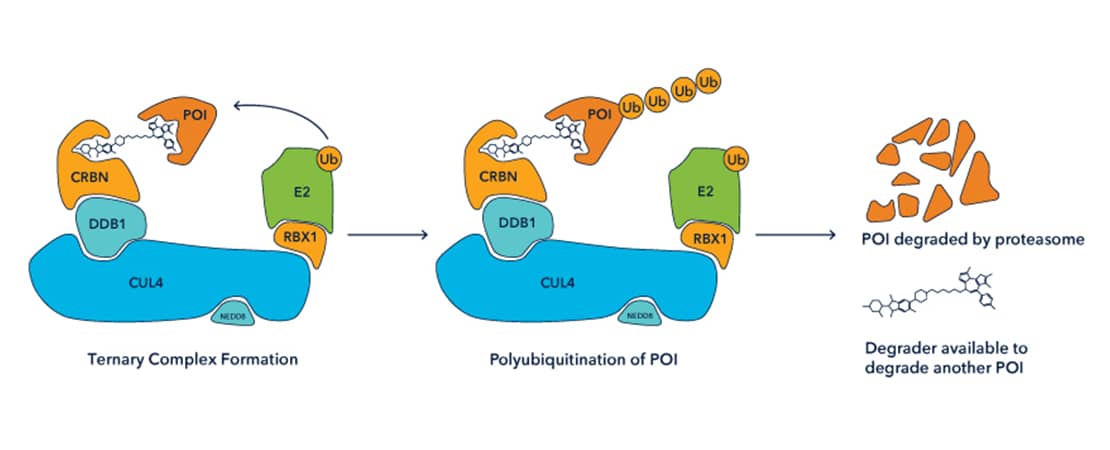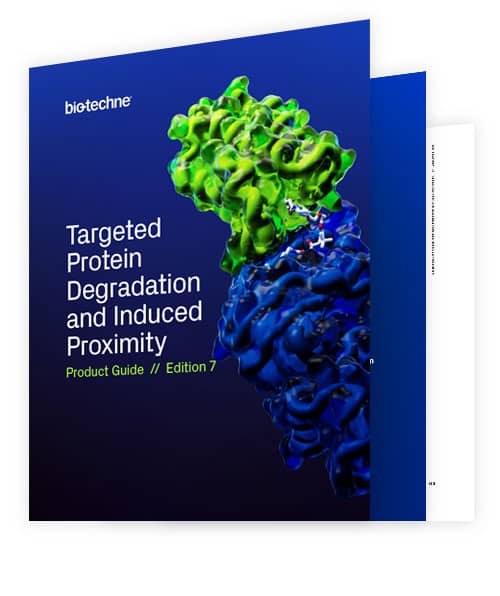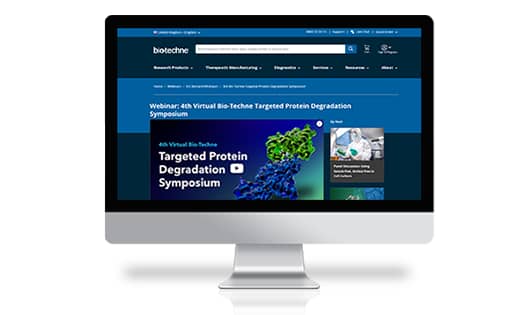用于诱导邻近和靶向蛋白降解的全套解决方案
什么是诱导邻近?
诱导邻近是一种利用两个经连接子共价连接的配体拉近两种蛋白质(即目标蛋白质 (POI) 和效应子)的方法。POI 和效应子的诱导邻近导致 POI 改变,从而触发生物学反应。POI 可以经历多种变化,包括翻译后修饰、降解、自噬、稳定、二聚化和细胞穿梭。
靶向蛋白降解 (TPD) 过程利用异双功能小分子降解剂(例如 PROTAC® 分子、SNIPER 等)结合 POI 并召集 E3 连接酶以形成三元复合物。这启动了 POI 的泛素化及其后续被蛋白酶体降解。使用这项技术有许多显著好处。在体外和体内均可实现高效和高选择性的蛋白敲减。降解剂通过反复作用并引导 POI 的泛素化发挥催化性作用,因此可以使用非常低的剂量而实现持续的敲减。
Bio-Techne 为靶向蛋白降解研发提供全套产品和服务。我们的工具将帮助您探索和验证您的目的靶标、开发新型蛋白降解剂分子并研究其活性以及构建您自己的降解分析法。我们的产品包括:小分子蛋白质降解剂,例如蛋白水解靶向嵌合体(PROTAC® 降解剂);分子胶;aTAG、dTAG 和 BromoTag® 降解剂及降解剂构建单元、泛素-蛋白酶体系统蛋白与分析法;蛋白降解分析法和定制降解剂服务。
靶向蛋白降解的产品和服务
靶标验证和探索
靶标验证,即确定潜在分子靶标参与生理功能或疾病进程的过程,是开发新降解剂、药物发现和生物研究的关键步骤。我们的 TAG 降解平台提供了一种差异化的靶标验证方法,它使用靶向蛋白降解可逆地敲减潜在蛋白质靶标并使得探索下游表型成为可能。
降解剂设计和合成
可使用 PROTAC 分子等小分子蛋白质降解剂实现靶向蛋白降解。Bio-Techne 提供成套产品和服务来支持您的降解剂设计和合成项目并且省时省经费,包括我们的 PROTAC Panel Builder 在线工具;庞大的现成的降解剂构建单元;以及用于发现新 E3 连接酶配体的工具。
用于靶向蛋白降解的分析方法
要成功开发用于靶向蛋白降解的小分子蛋白降解剂,需要经过一系列分析,来表征降解剂活性的特定方面。分析工作流程应包括:降解剂诱导的靶标接合作用和三元复合物形成;靶蛋白泛素化;以及靶标降解及其下游影响。使用多次正交分析将提高成功开发降解剂的机会。
E3 连接酶和泛素-蛋白酶体系统
Bio-Techne 通过旗下品牌 R&D SystemsTM 提供种类广泛的产品,帮助您探索和表征泛素生物学。正在快速扩大的产品组合包括高活性 E3 泛素连接酶(包括 SKP2、VHL、Cereblon (CRBN) 和 DCAF 蛋白)及分析试剂盒和组分,以及抗体。我们还提供 Cullin-Rbx 复合物(包括 NEDD 化 cullin),后者可以与您纯化的底物结合性复合物偶联,以生成活性连接酶。
靶向蛋白降解的定制服务
Bio-Techne 提供独特的定制服务产品组合,以支持您的 PROTAC® 开发及靶标验证项目。利用我们的定制化学专业知识开发活性降解剂,以敲减您选择的靶标或定制构建单元。我们还提供定制 E3 连接酶开发服务,帮助您构建自己的分析方法来研究泛素化。
靶向蛋白降解资源
手册:靶向蛋白降解和诱导邻近
手册:靶向蛋白降解和诱导邻近
我们的《靶向蛋白降解和诱导邻近研究用产品指南》重点介绍 Bio-Techne 可提供的工具和服务,以支持您的研究,包括蛋白降解剂、降解剂构建单元、定制降解剂服务、蛋白和蛋白降解分析法,以及用于诱导邻近研究的工具。
第 5 届在线 Bio-Techne TPD 和诱导接近研讨会
第 5 届在线 Bio-Techne TPD 和诱导接近研讨会
我们的第 5 届在线研讨会涵盖了从事诱导邻近研究的前沿科学家们的新进展 涵盖的主题包括:激活细胞凋亡的转录激酶、通过新型“靶向胶”降解 BRD9、发现蛋白降解剂和稳定剂、降解剂导引蛋白质泛素化的机制以及用于抗逆转录病毒药物开发的 HIV-1 Nef 降解剂。
科学综述:Simple Western 命中 TPD 的靶心
科学综述:Simple Western 命中 TPD 的靶心
本综述重点介绍了展示 Simple Western 高通量筛选降解剂活性的重要出版物,这些实验实现了可重现的定量、采用灵活的多重检测策略,能够快速获得结果,涵盖了从新降解剂的药物发现到临床转化的全过程。
网络研讨会:PROTAC® 降解剂开发工作流程解决方案
网络研讨会:PROTAC® 降解剂开发工作流程解决方案
最初在 Cell Bio 2020 年网络会议上,由我们的创新部经理 Hannah Maple 博士作为技术讲座演讲,这场网络研讨会介绍了 Bio-Techne 如何利用自身的全面工作流程解决方案支持您的降解剂开发项目。
Background Information

降解剂分子催化作用示意图。
降解剂分子如何发挥作用?
靶向蛋白降解是一种利用异双功能小分子降解剂引起高效、高选择性降解目的靶蛋白的技术。靶向蛋白质降解使得研究蛋白敲减的下游结果成为可能,并提供一种易用的靶标验证方法。
Bio-Techne 提供小分子蛋白质降解剂,包括 PROTAC(蛋白水解靶向嵌合体)分子和 TAG 降解剂 (dTAG/aTAG/BromoTag)。PROTAC 分子包含一种与靶标蛋白(已通过连接臂与 E3 连接酶配体相连)结合的配体。降解剂同时结合于靶蛋白和 E3 连接酶,形成一个三元复合物,后者启动靶蛋白泛素化,随后被蛋白酶体销毁。TAG 降解剂以类似原理发挥作用,但包含与化合物连接的 E3 连接酶配体,这种化合物结合 TAG 降解决定子与目的靶蛋白的融合物。降解剂可敲减没有已知配体的蛋白,能够靶向以前不能成药的靶标。
Bio-Techne 提供一系列支持靶向蛋白降解研究的其他产品和服务,包括让您实现自行创造降解剂的降解剂构建单元,以及泛素-蛋白酶体系统 (UPS) 蛋白和分析、蛋白降解分析法和定制降解剂服务。
为何使用降解剂?
小分子降解剂在靶蛋白敲减方面提供胜过基因调控的几个优势:
- 降解剂有细胞渗透性,适合体内和体外使用,可直接应用于细胞,无需转染或表达载体。
- 它们适用于多种细胞系,不要求细胞易于转染。
- 效果持续时间根据化合物洗脱情况可调整、可逆。
- 具有反复作用并引导靶分子泛素化的催化性作用模式,从而允许以亚化学计量浓度使用。
PROTAC® 是 Arvinas Operations, Inc. 的注册商标,经许可使用。
BromoTag® 是邓迪大学的注册商标,经许可使用。




